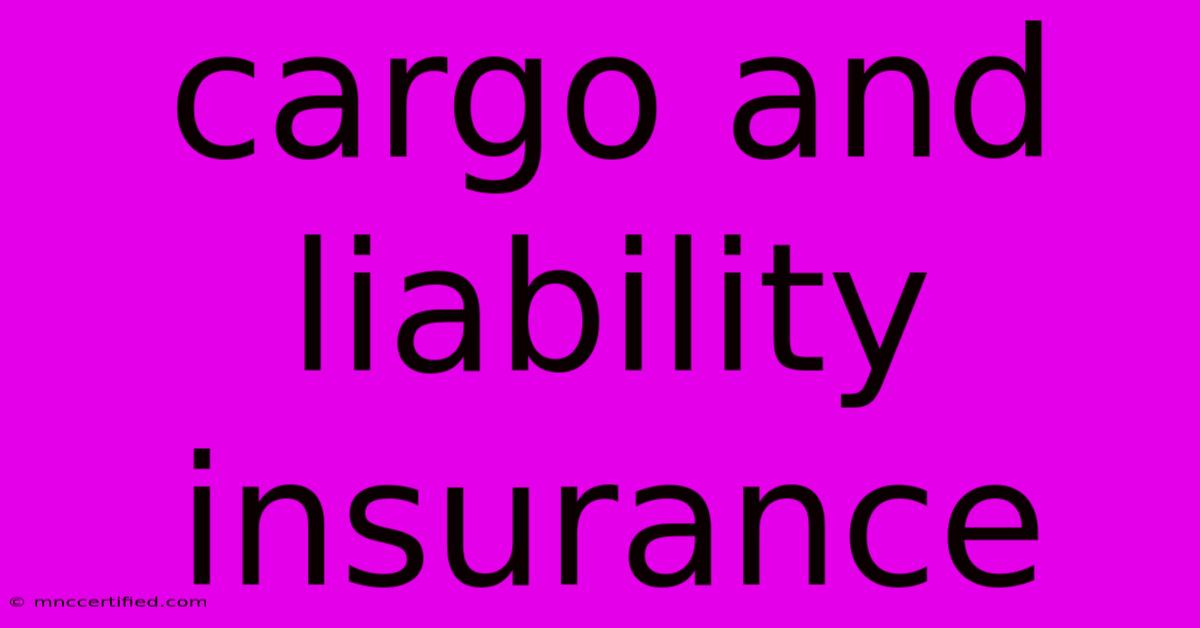Cargo And Liability Insurance

Table of Contents
Cargo and Liability Insurance: Protecting Your Business from the Unexpected
Shipping goods, whether domestically or internationally, involves inherent risks. Accidents, theft, damage, and even delays can lead to significant financial losses. This is where cargo and liability insurance become crucial. This comprehensive guide explores the intricacies of these vital insurance policies, helping you understand how they protect your business and your bottom line.
What is Cargo Insurance?
Cargo insurance, also known as marine cargo insurance, protects your goods during transit against various perils. It covers losses or damage to the cargo itself, from the moment it leaves the origin to its arrival at the destination. The policy covers a range of risks, depending on the chosen coverage level.
Types of Cargo Insurance Coverage:
-
Basic Coverage (Institute Cargo Clauses (ICC) C): This offers the most basic protection, covering only major perils like fire, stranding, and collision. It excludes many common risks, making it unsuitable for high-value shipments.
-
Broader Coverage (ICC B): Provides broader protection than ICC C, including risks like theft, pilferage, and water damage. It’s a popular choice for many businesses.
-
All-Risk Coverage (ICC A): Offers the most comprehensive protection, covering almost all risks of loss or damage except those specifically excluded in the policy. This is ideal for high-value or fragile goods.
Key Benefits of Cargo Insurance:
- Financial Protection: Replaces the value of lost or damaged goods, minimizing financial losses.
- Peace of Mind: Knowing your goods are insured reduces stress and allows you to focus on other aspects of your business.
- Improved Creditworthiness: Demonstrates financial responsibility and strengthens relationships with suppliers and customers.
- Legal Protection: Assists in resolving disputes with carriers or other parties involved in the shipping process.
What is Liability Insurance?
Liability insurance protects your business from financial losses resulting from claims of bodily injury, property damage, or other incidents caused by your actions or negligence. While it doesn't directly cover your cargo, it plays a vital role in protecting your overall business. Several types of liability insurance are relevant to cargo shipping:
- Product Liability Insurance: Covers claims arising from defects or flaws in your products that cause injury or damage. This is crucial if your cargo includes manufactured goods.
- General Liability Insurance: Provides broader coverage for incidents occurring on your premises or related to your business operations. This might include accidents involving employees handling cargo.
- Commercial Auto Insurance: Protects against accidents involving vehicles used for transporting cargo.
Choosing the Right Liability Coverage:
The appropriate level of liability coverage depends on the size and nature of your business, the value of your cargo, and the potential risks involved. Consulting with an insurance professional is highly recommended to determine the appropriate level of coverage.
The Interplay Between Cargo and Liability Insurance
While distinct, cargo and liability insurance often work in tandem to provide comprehensive protection. For example, cargo insurance covers damage to the goods themselves during transit, while liability insurance might cover damages caused by the goods, or claims against your business arising from a shipping accident.
How to Choose the Right Cargo and Liability Insurance:
- Assess your risks: Carefully evaluate the potential risks associated with your shipping operations, considering factors such as the type of goods, the mode of transport, and the shipping routes.
- Compare policies: Obtain quotes from multiple insurers to compare coverage options, premiums, and deductibles.
- Understand the policy wording: Pay close attention to the policy's terms and conditions, exclusions, and limitations.
- Work with an experienced broker: A knowledgeable insurance broker can help you navigate the complexities of cargo and liability insurance, finding the right policy for your specific needs.
Conclusion: Protecting Your Investment
Investing in adequate cargo and liability insurance is not an expense; it's a crucial investment that protects your business from substantial financial losses. By understanding the different types of coverage and choosing the right policies, you can significantly reduce your risk and ensure the continued success of your shipping operations. Don't wait until an incident occurs; proactive risk management through proper insurance is key to long-term stability and growth. Remember to consult with an insurance professional to tailor a policy specific to your unique circumstances.

Thank you for visiting our website wich cover about Cargo And Liability Insurance. We hope the information provided has been useful to you. Feel free to contact us if you have any questions or need further assistance. See you next time and dont miss to bookmark.
Featured Posts
-
Smart Contract Auditing Firms
Nov 28, 2024
-
Ace Rent A Car Insurance Cost
Nov 28, 2024
-
Colorado Municipal Bond Funds
Nov 28, 2024
-
Wooden Wheel Cove Trading Post
Nov 28, 2024
-
Lebanon Ceasefire Israel Hezbollah Agreement Points
Nov 28, 2024